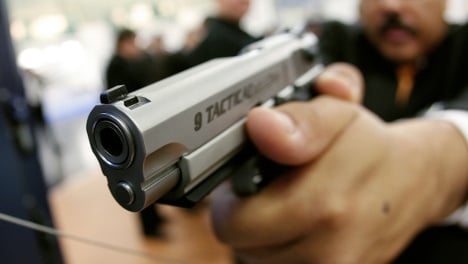On Sunday, 41-year-old lawyer Sabine R. killed her ex-partner and five-year-old son, then headed to a nearby hospital where she murdered an orderly and injured a police officer before being shot dead by another officer.
The incident came only days after a court in the nearby state capital Stuttgart began proceedings against the father of Tim Kretschmer, the Winnenden teen who shot dead 15 people before killing himself in March 2009. The businessman faces charges of weapons law violations for not keeping his weapon properly secured.
German newspapers on Tuesday tried to glean insights from another senseless tragedy.
The Badische Zeitung, based in Freiburg some 80-kilometres from Lörrach, expressed the region’s sense of shock and helplessness in the face of such incidents.
“Along with the speculation that comes after the fact there’s another question which we can’t spare the countless weapons lovers living in peace,” the paper said. “When there is a firearm at hand, is there not a threat that difficult psychological conflicts will escalate faster than without them? To this day the weapons lobby still hasn’t been able to convince us that the two have nothing to do with the other.”
Baden-Württemburg’s capital daily, the Stuttgarter Zeitung, warned against knee-jerk weapons law reforms, but said Sunday’s shocking events renewed questions about whether current regulations are adequate.
“Once again a weapon that should have been used for recreational sport shooting was used to kill, and this time the perpetrator was a markswoman herself,” the paper said. “She would not have been able to commit the crime if she had faced tighter weapon regulations.”
While stronger laws for such weapons may not prevent every crime, they would hinder at least a few, the paper said.
“After the most recent crimes we must be allowed to weigh the freedom of sports shooters against other people’s right to life. In this society people’s freedom is encroached for petty reasons. Is it really unreasonable then if marksmen only have a right to reach for their weapons when they are practising the sport? Stricter weapons law won’t make disturbed people better. But in individual cases it could soften the consequences of their behaviour.”
Hannover daily the Neue Presse agreed with this view, lamenting: “Why on earth do sport shooters bring their weapons and pistols into their homes at all? There is no plausible reason.”
These guns are meant only for use within sporting clubs, where they should be stored with the appropriate security precautions, the paper said.
“Clearly if the woman intended to kill the man and child she would have done it despite a strict weapons law. States of madness cannot be totally avoided, but sometimes they can be made easier for someone.”
The centre-left Süddeutsche Zeitung complained that insidious pressure from the gun lobby had politicians running scared. Trade-offs in favour of public safety needed to be made, the paper urged, even if that inconveniences law-abiding gun owners.
“The abuse of legal guns has claimed more lives than the terrorism of the Red Army Faction,” the paper said. “Yet instead of changing weapons laws, politicians freeze – out of fear of the shooting associations and the gun lobby.”
Very few people who legally own guns really need them, as opposed to hunters, forest rangers, and people who need a weapon for self-defence, the paper said. The majority of the 10 million legal guns in the country belong to sports shooters such as Sabine R.
But the fact that most of them were perfectly respectable people was scant comfort for grieving relatives of shooting victims, the paper said. At the very least, there should be a ban on keeping lethal sports weapons at home. Instead, these could be stored with the police, in a secure place with assigned supervisors.
“For it is the quick access to a pistol that allows murders like those in Lörrach,” the paper concluded.
But regional daily Leipziger Volkszeitung pointed out that the features of the crime were so inconsistent with the normal criminal patterns that the murders simply could not be used to justify further regulation.
“How can a community protect itself against mass murderers? Know-it-alls offer well-meant advice. People should keep an eye on young, male loners. Internet threats should be taken seriously. The state, it is often heard, must control how sports shooters secure their weapons, so that they do not mistakenly fall into the hands of their children,” the paper said.
“But since the bloody crime of Lörrach, it is clear that mass-murderers do not stick to regulations. Not only can they be over 40, they can even be women and have a job as a lawyer. She did not announce her murder. People … die even from a completely unmenacing, small-calibre sports pistol. Serious explosions can be brought about with petrol or spirits. The message from Lörrach is simple: there is no safe protection against maniacal murderers.”



 Please whitelist us to continue reading.
Please whitelist us to continue reading.
Member comments